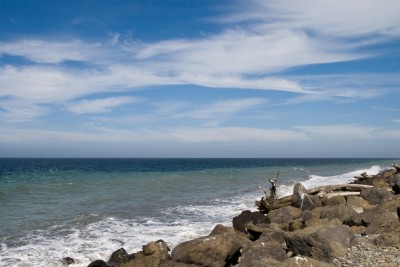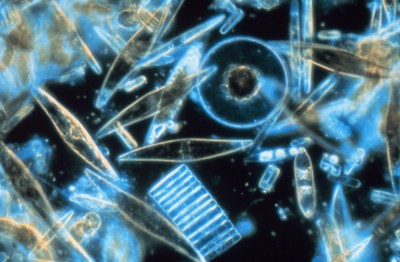8 March 2009
The Real Tasmanian Devil
Posted by Dan Satterfield
I have yet to write about Ocean Acidification in this journal. It’s kind of the “forgotten Great Uncle” of Climate Change. Well, it used to be. It’s getting a lot more attention, from the mainstream media, (I use that term loosely, and I am a part of it!) and Scientists themselves. A major new study published today, will likely get some major news coverage.
So, what is ocean acidification??
Ocean acidification is the change of the ocean pH, due to increased Carbon Dioxide in the atmosphere. The oceans actually absorb about one third of the CO2 we pump into the air every year. (About 30 billion tons). This is far more than all the volcanoes on Earth put out. (Despite what you might read online- those claims are silly, and anyone with a semblance of intelligence knows it.)
The Oceans have actually helped keep the Earth cooler than it would have been by now. That absorption of CO2 is now slowing according to some new research. Not good news.
What does this CO2 do to the ocean you may ask.

Oceans soak up a lot of CO2
Plenty.
Once absorbed, it turns into Carbonic Acid that makes the Ocean more acidic. The pH of the Ocean in the 1700’s was 8.2. It’s now down to 8.1. pH is a logarithmic scale so that’s a big drop.
If you have ever picked up shells by the seashore, then you likely know that those shells are the remains of ocean creatures. The shells are made of Calcium Carbonate. Something that will dissolve in acid. Ocean chemistry is VERY complicated, so I will spare you the details. (my knowledge of them is shaky at best)
So the basics are this. More CO2, means the pH of the ocean drops more. At some point, this may begin to have an effect on the very bottom of the food chain.
If these tiny Plankton cannot make shells, what will happen to them. Since they are the bottom of the food chain, what happens to everything up the chain. All the way to us??
You might think that trees produce the Oxygen you breathe, but most of it (50-90%) comes from tiny planktonic creatures in the oceans. These creatures actually are what put oxygen into our atmosphere in the first place.
The reason you should worry about these creatures is this: We humans are stupid. We do not know which species we allow to die, are the really important ones. Some minor species in the oceans or in a tropical rain forest, may be the key to the entire Earth ecosystem that supports us. If we kill them off, we kill ourselves off. Joseph Romm put this very well on his Climate Progress blog. I highly recommend it.
Along comes a new study, published today in Nature Geoscience. Dr. Howard Wilson, and Dr. Andrew Moy have compared the shells of tiny foraminifera, from the present, with those of the past. They find that the shells of these plankton have decreased a stunning 35%, since the industrial revolution began. This may well be the most robust study yet, that shows the oceans creatures are being affected by Climate Change. Nature Geoscience is an EXPENSIVE subscription, but a great summary for free is available from Scientific American online.
Some more bad news from the Scientists “Down Under”, Dr. Ben McNeil, and others now say that a level of 450 parts per million (ppm) in the atmosphere may very well be the tipping point for marine life. Levels above this point will severely affect marine life. This study was published in the Proceeding of the National Academy of Sciences (PNAS).

Plankton Rule the Oceans- Photo Credit: Prof. Gordon T. Taylor, Stony Brook University, USA
We will reach that level in about 20 years. Much of this research came from Plankton in the Tasmanian sea.
Want to learn more? The Royal Society published an exhaustive report on acidification in 2005. The Royal Society is the oldest Scientific body in the world. Past presidents of the RS included people like the Lord Kelvin, and Sir Isaac Newton.
Those tiny plankton, may turn out to be the real Tasmanian Devils.
Some more Climate Change news coming in a day or two….


 Dan Satterfield has worked as an on air meteorologist for 32 years in Oklahoma, Florida and Alabama. Forecasting weather is Dan's job, but all of Earth Science is his passion. This journal is where Dan writes about things he has too little time for on air. Dan blogs about peer-reviewed Earth science for Junior High level audiences and up.
Dan Satterfield has worked as an on air meteorologist for 32 years in Oklahoma, Florida and Alabama. Forecasting weather is Dan's job, but all of Earth Science is his passion. This journal is where Dan writes about things he has too little time for on air. Dan blogs about peer-reviewed Earth science for Junior High level audiences and up.
Dear Dan, I notice that your website includes a lovely photomicrograph of an assortment of diatoms with an intriguing blue hue. I also note that this photo is not properly credited to its creator. I know this because I produced this image in 1983 while conducting research at McMurdo Station, Antarctica. How it was posted and proliferated on the internet, I do not know.
I am flattered that you (and so many others) chose to use this image. While this image is in the public domain and not copyrighted, I think it only fair and ethical that you properly cite its creator. I would greatly appreciate it if you update your web page to associate the following with that image: “Photo Credit: Prof. Gordon T. Taylor, Stony Brook University, USA”
Note that until March 2008, this image was incorrectly attributed to Dr. Neal Sullivan, but he and I remedied this with the cooperation of the NOAA photo library curator and Wikipedia webmaster. You can verify my story by visiting the following sites.
http://en.wikipedia.org/wiki/File:Diatoms_through_the_microscope.jpg
http://www.photolib.noaa.gov/htmls/corp2365.htm
I am happy to report that you can also see this and four other of my images on permanent display in the Smithsonian’s “Science on Sphere” exhibit in the new Sant Ocean Hall (Museum of Natural History) in Washington, D.C. (See – http://ocean.si.edu/ocean_hall/, http://ocean.si.edu/ocean_hall/making_movies.html and http://ocean.si.edu/ocean_hall/press_releases/finalScienceOnASphereFactsheet.pdf )
Respectfully Yours,
Prof. Gordon T. Taylor
Stony Brook University
Stony Brook, NY 11794 USA
[email protected]
Thank you for pointing out the error, and it will be fixed immediately! The Science on a Sphere is a fabulous tool. I am working on getting one at our hands on Science Museum here in Huntsville!